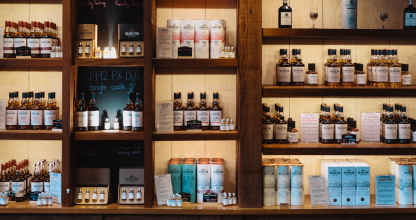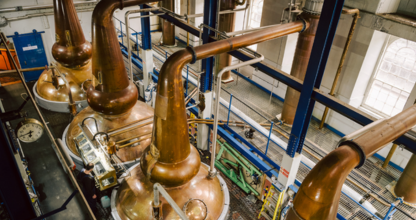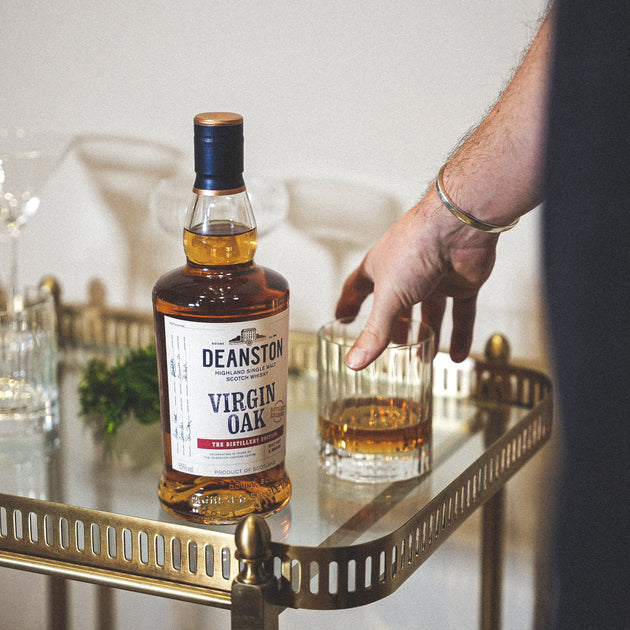Creating an organic whisky is a meticulous process that requires dedication to strict standards at every stage of production. At Deanston, we ensure we adhere to the rigorous regulations and steps involved to create organic Single Malt Whisky. First certified by the Organic Food Federation in 2000, we’re actually the World’s First Certified Scotch Whisky, so we’ve got this down to a fine art.

SOURCING ORGANIC INGREDIENTS
The foundation of organic whisky starts with the ingredients. We ensure that all raw materials are certified organic. This includes Organic Barley.
The barley must be grown without synthetic fertilizers, pesticides, or herbicides. Farmers must use natural methods to maintain soil health and crop vitality. Think of it as barley that’s been pampered like a Highland cow on holiday.

CERTIFICATION AND TRACEABILITY
Every ingredient and process must be certified by an accredited organic certification body. This certification ensures the entire production chain meets organic standards. Key aspects include:
- Documentation: Distilleries must maintain detailed records of all organic ingredients and processes to prove compliance. Yes, even whisky has its paperwork.
- Traceability: The origin of all ingredients must be traceable, ensuring that they are sourced from certified organic suppliers. We source ours from a few farms across Scotland.

CLEAN DISTILLATION EQUIPMENT
To prevent contamination with non-organic substances, distilleries must ensure their equipment is thoroughly cleaned. It’s not fun, but got to be done – Ask our Murray, our Distillery Manager. This involves:
- Cleaning Protocols: Establishing rigorous cleaning protocols to eliminate any residues from previous non-organic production batches.
- Segregation: Using dedicated equipment for organic production or thoroughly cleaning shared equipment before starting an organic batch.

NO ARTIFICIAL ADDITIVES
Organic whisky must be free from artificial additives, which means:
- No Artificial Colours: The whisky must derive its colour naturally from the cask aging process.
- No Artificial Flavours: All flavours must come naturally from the ingredients and the cask, with no added flavouring agents.
- No Preservatives: The whisky must be preserved through traditional methods without the use of synthetic preservatives.
Side note: all Deanston single malt whiskies have no added colour, artificial flavours or preservatives.

SUSTAINABLE PRACTICES
Organic certification often includes broader sustainability requirements, such as:
- Responsible Water Usage: Efficient and sustainable use of water throughout the production process.
- Waste Management: Implementing eco-friendly waste management practices to minimize environmental impact.
- Energy Efficiency: Using renewable energy sources, such as the hydroelectric power from the River Teith used by Deanston, to reduce the carbon footprint.

REGULAR INSPECTIONS AND AUDITS
Maintaining organic certification involves regular inspections and audits by the certifying body. Distilleries must:
- Comply with Inspections: Allow certifying bodies to conduct thorough inspections of the production facilities and processes.
- Ensure Continuous Improvement: Regularly review and improve practices to meet evolving organic standards and regulations.

INTERESTING FACTS TO SHARE WITH YOUR FRIENDS
- Organic Barley: Distilleries must source 100% organic barley, grown without synthetic chemicals. This barley’s had a better life than most celebrities!
- Certification Bodies: Accredited certification bodies ensure that every step of the production process adheres to organic standards. They’re like the whisky police, but with less shouting and more sipping.
- Clean Equipment: Rigorous cleaning protocols are necessary to prevent contamination from non-organic residues.
- Natural Additives Only: Organic whisky must be free from artificial colours, flavours, and preservatives.
- Sustainable Practices: Organic certification often includes requirements for responsible water usage, waste management, and energy efficiency.
Creating organic whisky is a testament to a distillery’s commitment to purity, sustainability, and quality. The next time you enjoy a glass of organic Deanston single malt, you can appreciate the meticulous care and dedication that goes into every drop.











